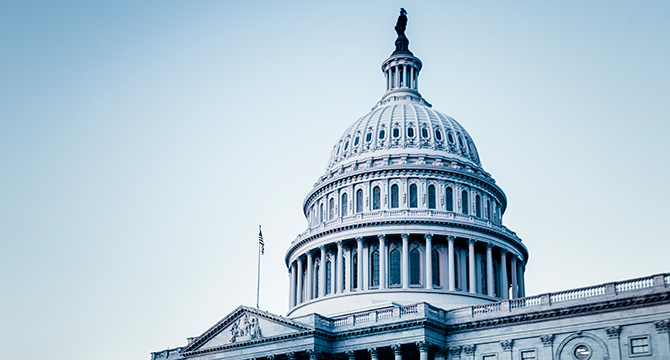Senate Releases Repeal and Replace Legislation on ACA: The Better Care Reconciliation Act of 2017

After weeks of secrecy, the Senate has released a discussion draft of legislation that is the counterpart of the American Health Care Act (AHCA) previously passed by the House. The Senate legislation, entitled the Better Care Reconciliation Act of 2017 or BCRA, closely tracks the language in AHCA.
Foley Attorneys are continually monitoring and analyzing the impact of the bill and will provide additional coverage as changes are announced. Below is a summary of the differences between the BCRA and AHCA.
Changes to the ACA Insurance Markets and Subsidies
Like the AHCA, the BCRA would make several immediate or near term changes to the health insurance markets originally established by the ACA including:
- Reduction in Tax Penalties. The tax penalties associated with the employer and individual mandates will be reduced to $0 effective January 1, 2016, essentially repealing the employer and individual mandates with retroactive effect.
- Reforms for Age and Pre-existing Conditions Remain. Several major market reforms implemented by the ACA are retained, including the ability for children to remain on their parents’ coverage until age 26, the requirement that individual health insurance be guaranteed issue and guaranteed renewable, and the prohibition on pre-existing condition exclusions.
- Application for Waivers. States may apply for certain waivers of ACA market reforms, including the requirement that health insurance provide coverage of ten “Essential Health Benefits” (EHBs), requirements for credentialing plans on the health insurance marketplaces (exchanges), and limits on deductibles or cost sharing for exchange plans. BCRA would direct the federal government to approve state applications for such modifications, unless the alternative proposal would increase the federal deficit.
- Increase of Premiums for Older Enrollees. Allowing states to increase premiums for older enrollees up to five times more than younger enrollees, increased from ACA’s maximum ratio of 3 to 1. Unlike the AHCA, the BCRA does not permit waivers of the ACA’s prohibition on determining premium amounts based on an individual’s health status.
- Addition of a Six-month Waiting Period. Under the updated draft of the BCRA released on June 26, 2017, insurers in the individual market may impose a six-month waiting period on any individual who cannot demonstrate 12 months of continuous coverage. Under the AHCA, health insurance companies in the individual market would assess a 30% premium surcharge if an applicant has gone longer than 63 days without continuous health insurance coverage during a 12-month lookback period.
- Cost-sharing reduction (CSR) Changes. CSR payment provisions in the ACA are repealed effective starting in 2020. However, the BCRA appropriates funds to make CSR payments through December 31, 2019. The AHCA did not appropriate any funds for CSR payments.
Additional Insurance Market Reforms
Like the AHCA, the BCRA would promote greater use of alternative approaches by states or by individuals to manage insurance costs, including use of high-risk pools and health savings accounts (HSAs).
- Expanded Tax Benefits Associated with HSAs. Effective January 1, 2018, the BCRA would expand the tax benefits associated with HSAs, and allow consumers to contribute substantially more pre-tax money to an HSA regardless of whether they have individual or employer-sponsored health coverage. HSA contributions would be allowed up to the limits on out-of-pocket expenses permitted for high deductible health plans (for 2018, $6,650 for self-only coverage and $13,300 for family coverage) (same as the AHCA).
- Changes in Flexible Spending Account Contributions. Effective January 1, 2018, ACA’s limit on the amount an employee may contribute to a health flexible spending account (health FSA) per year (for 2017, $2,600) would be repealed (same as the AHCA but the BCRA’s effective date is a year later).
- Ability to Purchase Over-the-counter Medications using FSA or HSA. Effective January 1, 2017, employees would again be able use health FSA and HSA funds to purchase over-the-counter medications without a prescription, as was the case before ACA was adopted (same as AHCA).
- Changes to the Effective Date of the Cadillac Tax. While many of the taxes included in the ACA would be repealed, the BCRA retains but delays the “Cadillac Tax” until 2026 (same as the AHCA). The Cadillac Tax is a 40% excise tax on high-cost health coverage provided by employers.
Significant Modifications to the Medicaid Program
The BCRA’s most significant impact may be felt on the Medicaid program, which would be slated for substantial reductions in funding along with new authority for states to modify the scope of their programs. Incentives to Roll-Back the ACA’s Medicaid Expansion. BCRA would provide significant financial incentives for states to reverse or roll back the expansion of Medicaid under the ACA to cover low-income adults who do not have dependents or serious disabilities.
- Reduction in Federal Financial Support for the Expansion. The Senate bill would gradually reduce the level of enhanced federal funding available for the expansion population each year until 2023, when funding would be available at a state’s normal Medicaid matching rate. The reductions are certain to create enormous budgetary problems for states that expanded Medicaid, potentially forcing modifications or reductions in benefits or the roll-back of the expanded coverage. The Senate bill also prevents states that elect to expand Medicaid on or after March 1, 2017 from receiving the enhanced funding.
- Disparate Treatment of Expansion and Non-expansion States. Medicaid expansion states would also face scheduled reductions in their disproportionate share hospital (DSH) payments, while BCRA would remove the reductions for non-expansion states. In addition, non-expansion states would have their DSH allotments increased between 2020 and 2024 if the state has a per capita DSH allotment below the national average. These increases would not apply to expansion states.
- New Authority for $2 Billion in Funds for Non-expansion States. Similar to the House legislation, BCRA would create new authority for $2 billion in funds for non-expansion states that can be used to increase Medicaid payments to providers up to the provider’s uncompensated costs of treating Medicaid and uninsured patients. A state would be disqualified from these payments if it elects to expand Medicaid coverage.
Changes to Limit Federal Support for Medicaid beginning in 2020. BRCA also makes significant changes to the financial structure of the Medicaid program that are unrelated to the ACA’s Medicaid expansion.
- Hard Caps on Federal Medicaid Funding through a Per Capita Calculation. The formula for this calculation closely follows the approach in the House legislation. However, the Senate version utilizes a different inflation adjuster beginning in 2025 that, if implemented, would limit the growth in federal Medicaid expenditures (on a per capita basis) to the general consumer price index for urban consumers. In recent years, Medicaid expenditures have risen much faster than this inflation measure. The per capita caps would apply beginning in 2020.
- Budget Neutral Adjustments to the Per Capita Caps for Low- and High-Cost States. New authority to adjust the per capita caps for specific enrollment categories for states that are 25% above or below the mean per capita cap for all states. Under this provision, states that spend more on a per capita basis for a specific enrollment category (e.g., for Medicaid-enrolled children, or seniors, or the disabled) would have their per capita caps reduced, and states that pay less than the mean would have their per capita cap increased. This authority does not apply to low-density states.
- Reduction to the Per Capita Cap for New York State. BCRA includes the language previously included in the House legislation that would reduce the per capita cap for New York state, unless New York state stops requiring local governments (other than New York City) to contribute to the Medicaid program.
- New Authority for States to Apply for and Receive Federal Block Grants. New authority for states, beginning with fiscal year 2020, to receive federal block grants for the operation of approved “Medicaid flexibility programs” for qualifying Medicaid beneficiaries. The legislation provides that the Medicaid flexibility programs would not be available for children, seniors, the disabled, or individuals in the expansion population, meaning interested states would apply them to low-income adults with dependent children. The Medicaid flexibility programs would be in lieu of the operation of the state’s normal Medicaid benefit, and would allow the state to modify conditions of eligibility, benefit package, and cost sharing. The amount of the block grant would be based on the per capita cap amount otherwise available to the state. States would be required to meet a maintenance of effort requirement that is lower than what they would otherwise need to expend to draw down the same amount of Medicaid funds.
- Phases Down the Cap on Health Care Provider Taxes. BCRA would phase down provider taxes that will be considered permissible without meeting alternate, more burdensome criteria from 6% to 5%, beginning in 2021. As a result of these changes, the provider taxes or fees in many states that help support Medicaid payments to hospitals and other providers may need to be reduced or modified.
Restrictions on Medicaid Eligibility. BCRA also implements new oversight and restrictions on beneficiaries accessing Medicaid coverage.
- Ability to Condition Medicaid Coverage on Satisfaction of a Work Requirement. States would be allowed to condition Medicaid coverage on the beneficiary’s satisfaction of a work requirement, which would be defined by federal law. This requirement could not be applied against pregnant, disabled, elderly, or minor (under age 19) beneficiaries, or against individuals who is the only parent or caretaker in the family of a child with disabilities or under age 6.
- Option to Require Re-enrollment for Expansion Enrollees. States would have the option to require individuals in the Medicaid expansion population to re-enroll at least every 6 months to maintain their coverage.
- Limits on Retroactive Medicaid Coverage. Current law requires Medicaid programs to cover services provided to an individual within the 3 months prior to the completed application. BCRA would reduce this to one month, effective October 1, 2017.
- Sunset Hospital Presumptive Eligibility. Hospital authority to make presumptive eligibility determinations will end January 1, 2020.
Medicaid Benefit Changes. New limitations or options for state Medicaid coverage.
- Access to Essential Health Benefits. BCRA removes the requirement for Medicaid expansion beneficiaries to receive a package including EHBs. The inclusion of this requirement in the ACA led to a significant expansion of Medicaid mental health and substance abuse disorder treatment services.
- Limited Exception to Medicaid IMD Exclusion. Medicaid currently does not cover services for adults who are residents in an institution for mental diseases (“IMD”). The BCRA would expand state’s options to cover adult psychiatric hospital services, regardless of whether the IMD designation applies, when an individual has a stay of up to 30 consecutive days (and up to 90 days in a calendar year). State would not be eligible to cover these services if the state reduces the number of licensed beds at psychiatric hospitals owned, operated, or contracted by the state, or reduces the non-Medicaid funding expended by the state and political subdivisions for inpatient and outpatient psychiatric treatment.
Other Notable Changes
- Medicare Program Remains Intact – Like the AHCA, the Senate bill does not seek changes to the benefits or coverage under the Medicare program, although it does remove taxes imposed by the ACA that help finance the Medicare trust fund.
- Substance Use Grants – An additional $2 billion would be available as grants for states to support substance use disorder treatment and recovery support services for individuals with mental or substance use disorders.
- Additional Funding to Federally Qualified Health Centers– An additional $422 million in funding will be provided to Federally Qualified Health Centers through the Community Health Center Fund in 2017.
- Planned Parenthood Funding – The BCRA would prevent any Medicaid, CHIP, and certain federal block grant payments from being made to Planned Parenthood for one year.
The Question Remains as to Whether the BCRA Will Pass the Senate
Yesterday, the Congressional Budget Office (CBO) released its estimate that 22 million people will lose coverage by 2026 if the Senate bill were to become law. The CBO also projected the measure would reduce the deficit by $321 billion between 2017 and 2026, roughly $200 billion more savings than in the House’s AHCA.
Senate Republican Leader Mitch McConnell (R-KY) intends to bring the bill to the Senate floor for a vote later this week under a process known as reconciliation, which means the measure can move forward with only 51 votes. Should he be successful, the House could pass the Senate bill at the end of the week and send the measure to President Trump for his signature. However, thus far five Republican Senators have stated they oppose the bill as currently written: conservative Senators Rand Paul (R-KY), Mike Lee (R-UT), Ted Cruz (R-TX) and Ron Johnson (R-WI) and moderate Senator Dean Heller (D-NV). Several other Senators have expressed concerns over a multitude of issues with the bill, including the 22 million individuals that are projected to lose coverage, lack of funding for Planned Parenthood for one year, and the lack of sufficient time to review and understand the likely impacts of the legislation. McConnell can only lose votes from two Senators or the measure will fail. Democrats have repeated their willingness to work with the Republicans to improve upon the Affordable Care Act, but oppose the BCRA or the “repeal and replace” bill in its current state.
Negotiations are underway as Senator McConnell tries to secure of the votes in order to move the bill this week. He has significant flexibility to negotiate on Medicaid, funding to combat opioids, and other aspects of the measure because the $321 billion in projected savings far exceeds the amount required. Senators are scheduled to be in their home states next week for the July 4th recess. If the measure does not pass before they leave Washington, D.C., history tells us the path could become even more difficult once they return. President Trump has reportedly contacted many Senators to hear their concerns and Vice President Pence, who is expected to expected to deliver the 51st vote to get the bill over the finish line, is scheduled to attend today’s regularly scheduled meeting of the Senate Republicans.
We will continue to monitor the Senate Legislation and will provide updates on any changes that happen in an effort to gain support of the existing bill.
Senate Vote Delayed
Editors note: This section was added at 2:30pm CDT on Tuesday, June 27th.
Senator McConnell announced this afternoon (Tuesday, June 27th) the Senate will not vote on BCRA this week, due to concerns raised by multiple Republican Senators who want more time to understand the bill’s impact on their respective states. The earliest the Senate could take up the bill is the week of July 10th, following a scheduled recess the previous week. The Senate is in session for three weeks during the month of July and then adjourns for five weeks beginning July 31st. If the bill has not passed before the August recess its prospects are greatly diminished.
We expect negotiations to continue as McConnell works to address Senators’ concerns and secure the votes necessary for passage.



